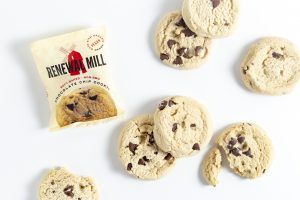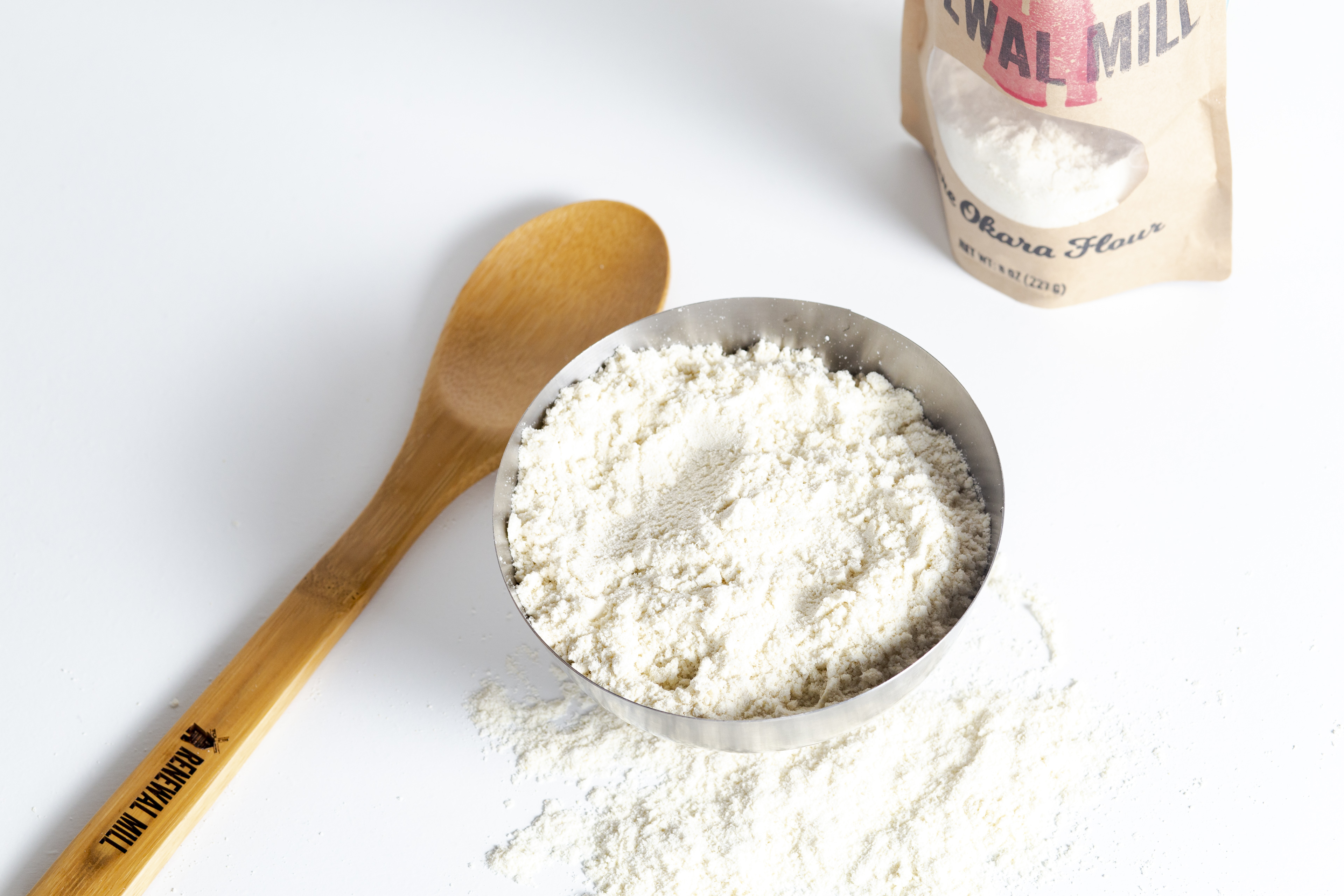There’s an old saying: “If life gives you lemons, make lemonade.” This old saw could easily apply to new innovative companies that are converting food waste into quality, nutritious foods and ingredients, a process known as upcycling.
One of those companies is Renewal Mill, a “next generation” food ingredients company that upcycles the waste product from soymilk production into a high protein, high fiber, and gluten-free flour.
Food waste is a big problem. According to the U.S. Department of Agriculture, 30 to 40 percent of the food produced for human consumption in the U.S. is wasted at a cost of more than $200 billion, and $1.2 trillion worldwide. The USDA says this amount of waste has “far-reaching impacts on food security, resource conservation, and climate change.” According to Project Drawdown, reducing food waste is the number three solution to reducing climate change following refrigerant management and wind turbines.
Transforming okara into flour
Claire Schlemme recognized the food waste problem as founder of an organic juice company when she saw piles of leftover produce pulp from juicing. In 2016 she founded Renewal Mill to develop sustainable food waste solutions. Their first solution was to upcycle okara, the pulp remaining after soybeans are pureed and filtered to make soymilk, into a nutritious flour for food products. Renewal Mill formed a partnership with Hodo Foods, a San Francisco-based manufacturer of organic soymilk and tofu products. Hodo Foods produces about 15,000 pounds of okara per week, which in the past would have been sent to a landfill or used as animal feed. Renewal Mill installed proprietary dehydration equipment at the end of Hodo Foods’ manufacturing process that dries the okara, which is then milled into flour.
“The okara comes off their soymilk machines and funnels directly into our equipment,” says Caroline Cotto, chief operating officer at Renewal Mill. “It’s dehydrated on site and we transport it to a milling partner who makes the final flour ingredient.”
The resulting okara flour is nutritious: one-third protein, two-thirds fiber, and gluten-free. It also has functional benefits for food manufacturers.
“It improves moisture retention in products which can improve shelf life and is neutral in taste and flavor,” Cotto says. “It integrates quite well into baked goods and flour-based applications.”
There is an environmental benefit as well: okara’s carbon footprint is 40 percent less than that of wheat, according to Cotto.
“That comes from preventing decomposition in the landfill and eliminating the growing phase.”
Many food applications
Renewal Mill’s okara flour can be used in a range of food applications including pizza dough and baked goods such as muffins, breads, pasta, and cookies. It can also be used as a thickener or filler for meat alternatives, condiments, and sauces. Because of its high fiber content, the flour can be used to make puffed snacks or cereals.

Renewal Mill’s chocolate chip cookies are a “proof of concept” of its okara flour
“It can be used for anything you want to add fiber to or thicken,” Cotto says.
A meal kit manufacturer uses Renewal Mill’s okara flour as an ingredient in orange chicken sauce. Another customer uses it in a snack chip formulation. Another uses the flour to make cookies to put in its ice cream products.
Renewal Mill manufactures a chocolate chip cookie that is sold in retail stores in San Francisco and as an office snack to high tech companies in the Bay Area.
“The cookies are a proof of concept to test the ingredient in the marketplace,” Coto says. “We are looking to expand distribution (of the cookies).”
The flour is also sold retail through one of Renewal Mill’s partners, Imperfect Produce, another anti-food waste company.<
But Renewal Mill’s main target market is selling its flour as an ingredient to consumer packaged goods (CPG) manufacturers.
“We are looking to sell significant quantities of okara to CPG companies who want to boost the nutrition or environmental sustainability of their products,” Cotto says.
Renewal Mill’s flour is certified organic by CCOF. Cotto says her company would also seek Non-GMO Project verification if their customers request it.
Upcycling as a new trend in food production
Renewal Mill is one of a growing number of companies that are upcycling by-products or waste materials into new materials or better quality products. Other upcycling businesses include Regrained, which transforms grain waste from beer brewing into nutrition bars; Lazy Bear Tea makes tea from cascara, the dried skin that covers coffee beans; and Montreal-based Stillgood, Inc. upcycles juice pulp and spent grains into bars, snacks, cookies, and other treats. More companies are emerging.
“It’s an exciting time to be part of the anti-food waste movement,” Cotto says.
Helping to feed the world with upcycling
Renewal Mill aims to expand its upcycling beyond okara. They are testing fibrous waste products from oat and almond milk production. Other possibilities include grape and olive pomace, the pulpy residue left after crushing, as well as pistachio shells, potato pulp, and almond meal. Renewal Mill also has an exclusive partnership with a San Francisco-area plant-based milk manufacturer to upcycle their by-product into another ingredient.
Cotto says Renewal Mill is “revving up production” to meet growing demand for its okara flour, which now exceeds the supply.
“We are now trying to scale up our operations,” she says.
To help grow its business, Renewal Mill received a $2.5 million investment from HG Ventures this past January.
Renewal Mill’s innovative upcycling has earned several awards including the IFTNEXT Future Food Disruptor of the Year in 2018 and the Sabin Sustainable Venture Prize from Yale in 2016. Renewal Mill was also a finalist for Kroger’s Zero Waste/Zero Hunger Challenge.
Looking at the big picture, Cotto says upcycling will play a key role in feeding the world in the coming years. “There will be 10 billion people by 2050, and it’s not going to be a matter of growing more food. We have enough food to feed the world; it’s about using it more efficiently. We think that upcycled ingredients and products are really an effective way to do that and keep more soluble nutrition in the human supply chain.”









